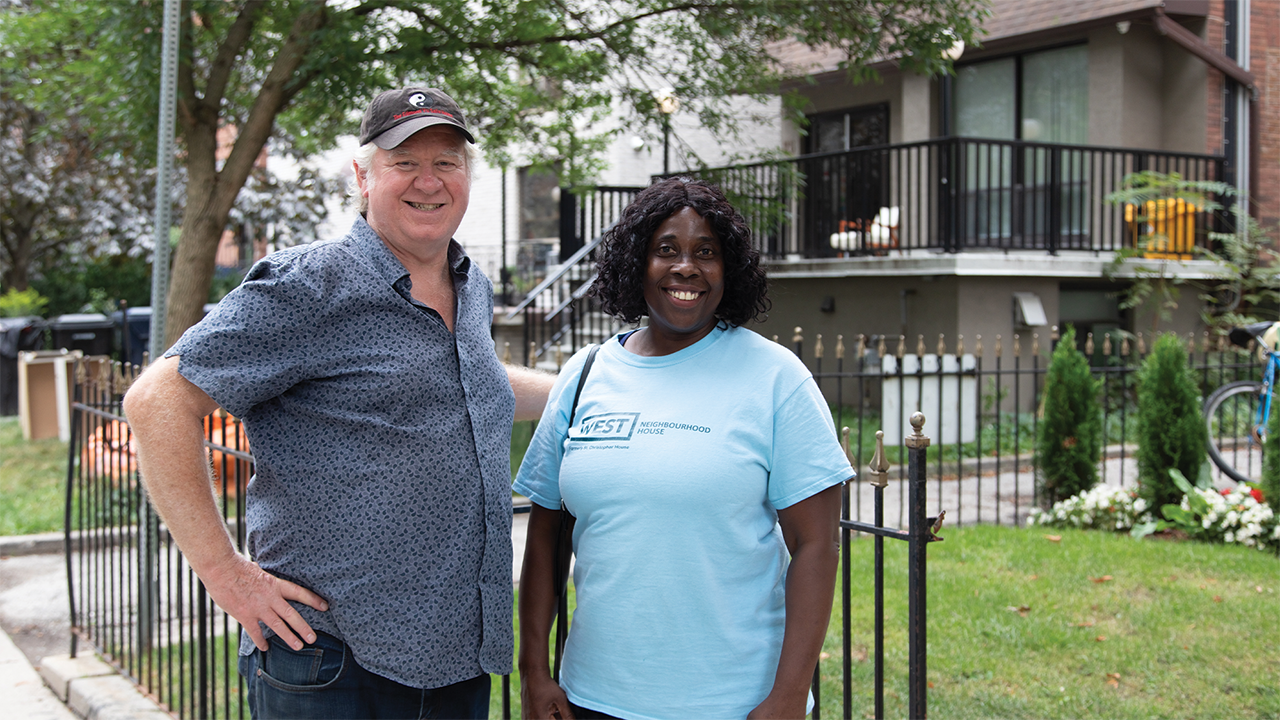
United Way Greater Toronto is partnering on supportive housing initiatives and community land trusts to ensure people stay housed
Toronto’s Parkdale neighbourhood has long been a landing pad for newcomers and others seeking low-cost housing. But over the past 10 years, the neighbourhood has been going through a rapid transformation.
“We’ve watched an enormous increase in rents and a dislocation of people who can’t afford them,” says Victor, Executive Director of United Way-supported Parkdale Activity-Recreation Centre (PARC).
The skyrocketing cost in living is pushing long-time residents out of their homes, hitting people living on a low income the hardest. According to Beryl-Ann, a Community Development Peer Worker with United Way-supported West Neighbourhood House, this is forcing people into untenable situations.
“Some people are living on peoples’ couches. You’re seeing multiple families staying in two- or three-bedroom apartments,” she says. “If you’re on Ontario Works or ODSP, or even if you’re making minimum wage, the money is just not enough to cover the rent.”
It’s a story that’s becoming too familiar as our region battles the affordable housing crisis. People being forced to choose between basic necessities or paying their rent. Tight-knit neighbourhoods broken up. More of our neighbours finding themselves without a roof over their heads.
But it doesn’t have to be this way. United Way is working with Victor, Beryl-Ann and other partners across Peel, Toronto and York Region to keep people housed and neighbourhoods welcoming through supportive housing initiatives.
“The community organizations we work with are in encampments, they’re providing housing for people, they’re trying to help people stay in the housing that they have,” says Ruth, United Way’s Vice President of Community Investment & Development. “We have that pipeline to understanding what is really going on for people who are at risk of homelessness or who are homeless.”
That insight and network means that we can bring players together to find out-of-the-box solutions to the housing challenges facing our region. One example? The Social Medicine Initiative (SMI) in Parkdale.
Created in partnership with the University Health Network and the City of Toronto, this first-of-its-kind development will create 51 units of permanent, affordable, supportive housing for people with chronic and complex health conditions who are at risk of or experiencing homelessness. It exists because of the research and advocacy of a host of United Way partners, including PARC, West Neighbourhood House and the resident-led Parkdale People’s Economy.
The SMI is unique because in addition to housing, it ensures residents have a host of health and social supports, all of which will streamline access to healthcare, food, transportation, good jobs, social engagement and life skills development. This wraparound support sets people up for success, helping to ensure they stay housed in the long term.
“It’s going to be a one-stop shop,” explains Beryl-Ann. “The residents are getting the social support and medical care that they need, all at 150 Dunn.”
SMI is just the most recent example of United Way’s work helping to improve affordable housing options in Parkdale. More than a decade ago, PARC, with the support of United Way, helped launch another innovative, community-led solution: the Parkdale Neighbourhood Land Trust.
The trust is steered by local residents and was created to give them more agency over what was happening in their neighbourhood. Its goal was to purchase local properties and make sure they were used to meet the needs of the community. Today, the trust owns 84 properties in the area, including a number of affordable, supportive housing units managed by PARC.
“A Land Trust, which at its roots is democratic, encourages residents to do the kind of work and thinking and problem solving that’s required in order to have good housing,” says Victor. “That’s very different than the experience with corporate landlords where there’s often no way for tenants to intervene or have their concerns heard and to be taken seriously.”
These kinds of place-based, community-led supportive housing initiatives are essential to ensuring residents not only have access to affordable housing, but also have a say in how their neighbourhood grows.
That’s why United Way is championing these approaches in neighbourhoods across Toronto and our region.